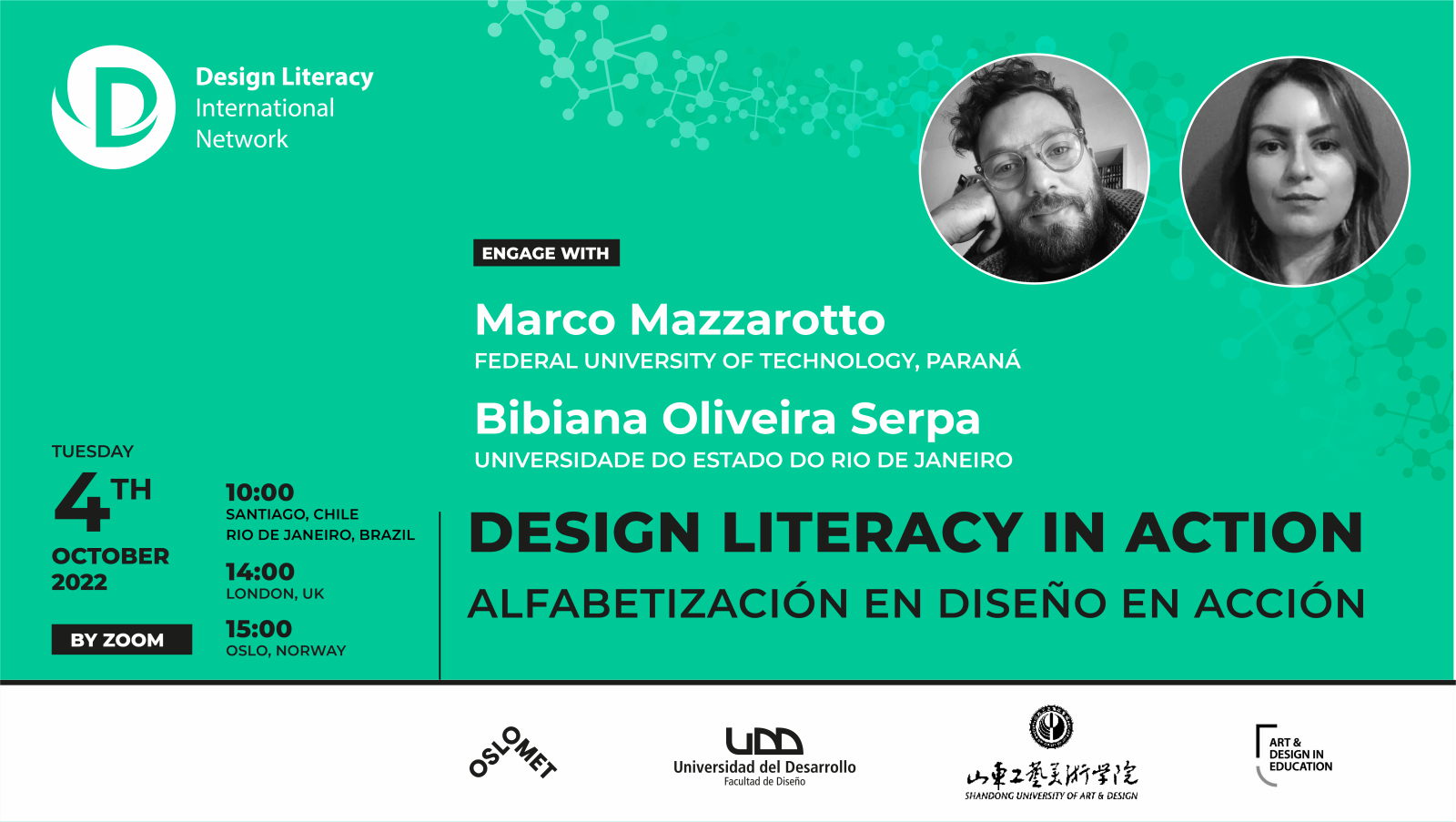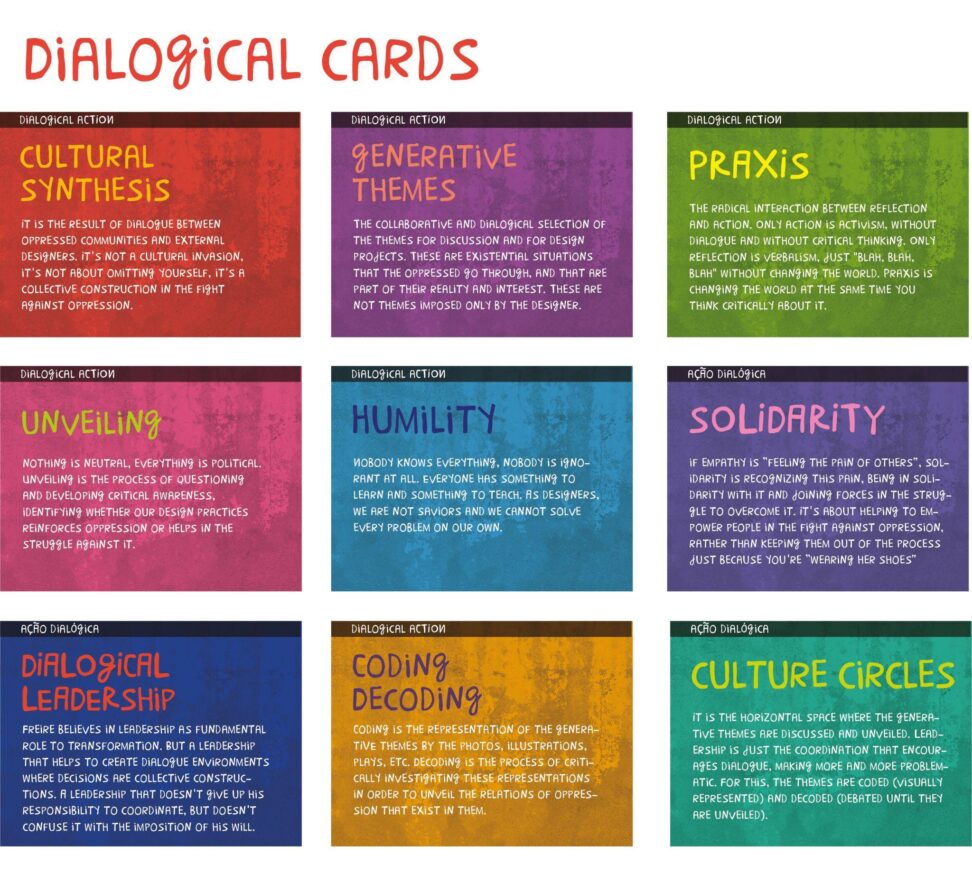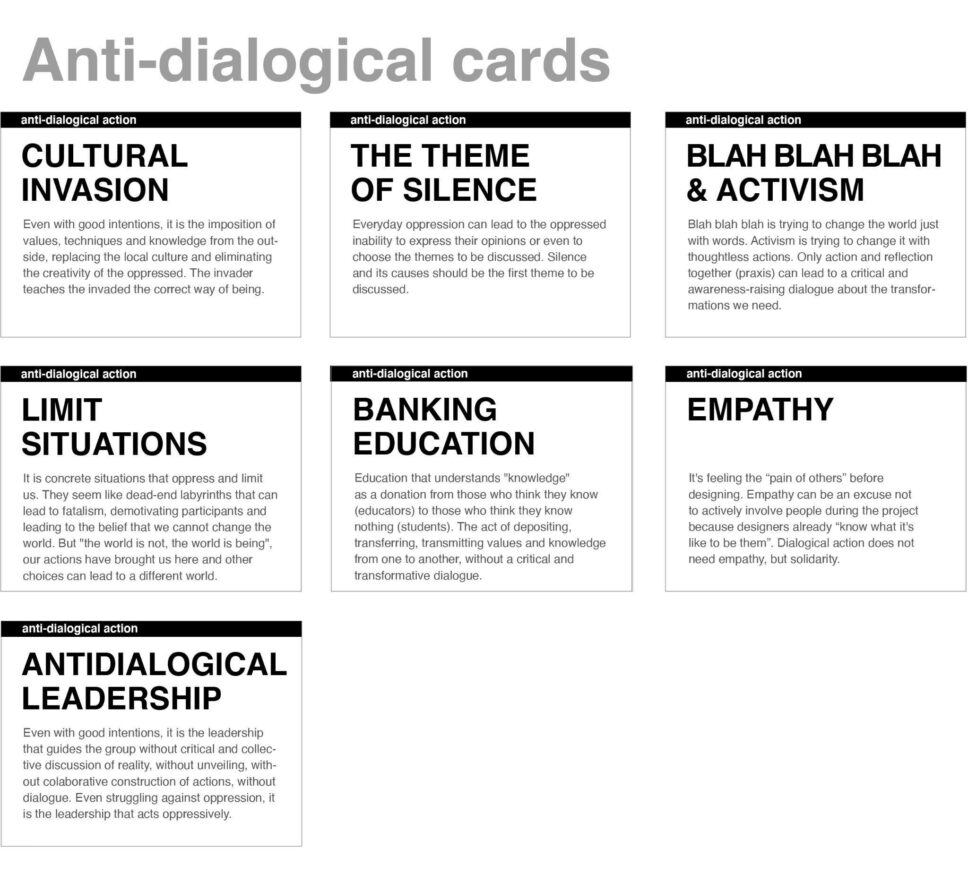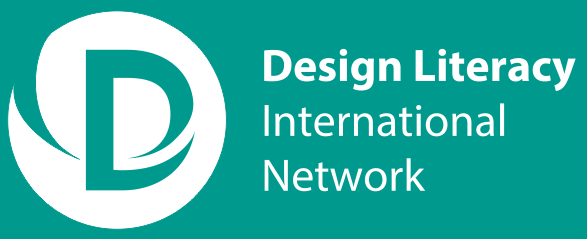
Engage with Marco Mazzarotto & Bibiana Oliveira Serpa | Design Literacy in Action
Marco Mazzarotto’s and Bibiana Oliveira Serpa’s upcoming talk titled Design Literacy in Action is based on their co-authored paper titled (anti)dialogical reflection cards: Politicizing design education through Paulo Freire’s critical pedagogy (2022) which was presented as part of the Design Literacy track (Bravo, Nielsen, Lutnæs, Bohemia, & Börekçi, 2022) at the 2022 Design Research Society international conference.
In the upcoming October’s Engage with Ideas event, Marco and Bibiana will discuss how Freire’s theory of ‘dialogical and anti-dialogical action’ (1996 [1970]) may guide design educators to consider what subjectivities they aim ‘instill’ in their design students.
The terms in Table indicate methods for dialogic action developed by Paulo Freire that can serve as inspiration for politically engaged design practices.
| Dialogical | Antidialogical |
|---|---|
| Cultural Synthesis | Cultural Invasion |
| Generative Themes | The theme of Silence |
| Praxis | Blah Blah Blah and Activism |
| Unveiling | Limit Situations |
| Humility | Banking Education |
| Solidarity | Empathy |
| Dialogical Leadership | Antidialogical Leadership |
They will demonstrate ‘reflective cards’, an open educational material, which they developed. Marco and Bibiana provide these three examples of how the cards can be used:
- Mediation of discussions about experiences in design projects.
In groups, the cards can be used for each participant to reflect on past or current design experiences. - Glossary of critical pedagogy concepts.
For introductory classes that aim to work on the intertwining of critical pedagogy and Design, the cards can serve as a synthesis material that supports the readings of Paulo Freire’s original texts, presenting the concepts in an organized and summarized format. - Critical self-evaluation material.
During the course of design projects, the cards can be used by participants to critically reflect on decisions and actions that need to be taken or to face challenging situations that arise.
They reason that design educators should abandon the perceived unpolitical orientation of their and theirs design graduates practices. Marco and Bibiana argue for politicizing design educators actions and directing them to intervene in the world in a dialogical way seeking to overcome oppressions. To facilitate the process of politically engaged design practices they developed (Anti)dialogical Reflection Cards, consisting of 16 cards, to:
- foster critical reflections on past and current Design practices, identifying oppressions and reflecting on ways to fight against them;
- help in the introduction to Paulo Freire’s critical pedagogy concepts;
- encourage counter-hegemonic and decolonial forms for Design praxis.
The cards are organized in seven opposite pairs (14 cards), referring to dialogical or anti-dialogical practices or concepts, and two cards that represent methods for dialogical action that can serve as inspiration for politically engaged and critical design practices. In the future, the material may be expanded to include other concepts and methodological proposals from Freire’s work. The following are the English versions of the cards that compose the material, divided into “Dialogical Cards” (figure 1) and “Anti-dialogical Cards” (figure 2).


The visual identity of the cards has deliberated. The Anti-dialogical cards (figure 2) were produced to represent the modernist ideology of universal, minimalist, neutral, and functionalist design which claims that its principles constitute a simple language, accessible to all and devoid of cultural specificities or expressions that hinder its use. The Dialogical cards (figure 1) design presents irregularities, excesses and inconsistencies that are seen as mistakes by the ‘Western’ design paradigm. Thus challenging the notion of the ‘correct’ design.
Event recording in ENGLISH:
Event recording in SPANISH:
Marco Mazzarotto is Assistant Professor at the Federal University of Technology – Paraná, designer at the latinamerican community development NGO Teto and co-founder of the Design and Oppression network. He seeks dialogical, critical and participatory strategies to overcome oppression in design.
Bibiana Oliveira Serpa is PhD candidate in Design at ESDI/UERJ, feminist militant and co-founder of the Design and Oppression network. Her research associates participatory and critical design approaches to politicization actions within social movements and seeks to understand ways for an engaged design practice having as reference popular education and feminism.
We are looking forward to engage with Marco and Bibiana ideas during the October’s event and to see suggested use of the (Anti)dialogical Reflection Cards.
References
Bravo, Ú., Nielsen, L. M., Lutnæs, E., Bohemia, E., & Börekçi, N. A. G. Z. (2022). Editorial: Design Literacies: pasts, presents, and possible futures. In D. Lockton, P. Lloyd, & S. Lenzi (Eds.), DRS2022: Bilbao (pp. 1–8). DRS. https://doi.org/10.21606/drs.2022.1065
Freire, P. (1996 [1970]). Pedagogy of the Oppressed (M. Bergman Ramos, Trans.; 2nd ed.). Penguin.
Mazzarotto, M., and Serpa, B.O. (2022) (anti)dialogical reflection cards: Politicizing design education
through Paulo Freire’s critical pedagogy, in Lockton, D., Lenzi, S., Hekkert, P., Oak, A., Sádaba, J., Lloyd, P.
(eds.), DRS2022: Bilbao, 25 June – 3 July, Bilbao, Spain. https://doi.org/10.21606/drs.2022.710
Bookings
Bookings are closed for this event.
